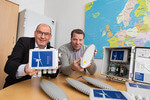EESC calls for a European Energy Union that involves and benefits all EU citizens
The Energy Union is not only relevant to sectoral policies such as energy, transport and climate but offers a number of opportunities to make Europe more democratic, cohesive, competitive and just. To this end, an effective energy dialogue with organised civil society at EU, national, regional and local levels is fundamental.
In the EESC opinion adopted at the April plenary session, Toni Vidan and Christophe Quarez take stock of the progress made towards an EU Energy Union, following the release by the European Commission in November 2017 of the third report on the subject.
Energy dialogue for, by and with citizens
The EESC is pursuing a vision of an Energy Union for the citizens, by the citizens, and with the citizens: "Our vision is of an Energy Union with citizens at its core, where citizens take ownership of the energy transition, benefit from new technologies to reduce their bills, participate actively in the market, and where vulnerable consumers are protected." (Energy Union Framework Strategy)
Organised civil society must be actively and permanently involved. All citizens must benefit from the opportunities the energy transition offers and at the same time be protected from the risks associated with it. An effective energy dialogue requires a concerted effort from all EU institutions and their members, both in Brussels and on the ground in the Member States, to discuss the benefits and the issues of the Energy Union, to involve citizens in drawing up energy transition plans and to organise public debates on how people imagine their energy future in Europe.
According to the EESC, it is important to consider the long-term perspective of the Energy Union, looking ahead to 2050 in accordance with the Paris climate agreement, and to tackle the technical, market and institutional barriers preventing consumers, communities and SMEs from fully participating and benefiting from the clean energy transition.
The Committee therefore proposes practical solutions to try to overcome the existing issues in the future.
- A Social Pact for a Citizens-driven Energy Transition
The EESC is happy to note that the European Commission is willing to consider the social dimension of the Energy Union, and that it has decided to create a specific chapter in the next report and developed initiatives in this regard, such as those linked to carbon-intensive regions and energy poverty.
However, it thinks that further steps should be taken in that direction, for example by jointly drawing up a "Social Pact for a Citizens-driven Energy Transition". This would become the sixth dimension of the Energy Union and include all of the social aspects: quality job creation, vocational training, consumer education and training, social protection, specific plans for transition regions where jobs are lost, health and energy poverty.
- A European Energy Information Service
According to the Committee, strong and democratic Energy Union governance needs a "European Energy Information Service", which would ideally be created within the European Environment Agency. This service would monitor the quality of the data provided by Member States, develop with stakeholders the assumptions for different scenarios, and act as an entry point for collecting the datasets needed to assess the progress of the Energy Union. All decision-makers, businesses and the general public would have free access to the results of its work.
- A European Energy Transition Adjustment Fund
The EESC is also of the view that the Energy Union requires a "European Energy Transition Adjustment Fund" to accompany workers who may be at risk of losing their jobs. This would represent a tangible signal that the EU wants to make sure that the energy transition does not leave anybody behind.
- A Green Erasmus Pro programme
Finally, the Committee considers that the European Commission should invest in projects to attract more young people into the growing energy transition sectors. For example, it could develop a "Green Erasmus Pro programme", building on its Erasmus Pro pilot project.
Background
The EESC has also contributed to the EU energy debate by adopting opinions on the first and second reports on the Energy Union, published by the European Commission in 2015 and 2016. It has sought to maintain a focus on citizen involvement in the Energy Union and the social dimension, leading for example to achievements like the establishment of the EU Energy Poverty Observatory and the Coal Regions in Transition Platform.
- Source:
- EESC
- Author:
- Press Office
- Link:
- www.eesc.europa.eu/...
- Keywords:
- EESC, Europe, Energy Union, participation, people, support

























